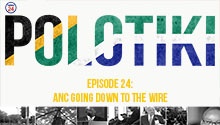Louis Washkansky was born in Lithuania in 1914. When he was nine years old, he, together with his mother, brothers and sisters, emigrated to Cape Town to join their father. Old man Washkansky had gone to Cape Town ahead of his family and started up a grocery store in Gardens near the city centre.
Louis, a big bear of a man, was called Washy by his friends. He was an enthusiastic weightlifter and wrestler and spent his free time coaching kids at the local wrestling club. It was here that Washy met his best friend Solly Sklar.
"Washy could always look after himself, no matter what obstacles came his way. Put him in the middle of the desert without water and Louis would come riding out on a camel loaded up with beer,' Solly commented once.
The two men joined the South African Armed Forces in 1940 as members of the Engineering Corps and went to North Africa to fight the
Germans and the Italians. They shared a trench during the war and
Solly recalls that his old friend was courageous but with a soft heart for the underdog.
'Louis was clever too. He once made a contraption with which he could make his own brew, with kick, from orange peels and raisins.
It had pipes and tubes like a real chemistry set. After five days, the brew would bubble up and a green liquid would drip into a can. Louis swopped this contraption for some eggs that he shared with us all. Everyone loved the guy.'
However, his hard-living, unhealthy lifestyle of drinking and smoking finally caught up with him and he had his first heart attack in December
1960. He also developed diabetes. For seven years Washy struggled with the disease in his chest and increasingly difficult breathing.
In January 1967, his doctor referred him to the cardiology clinic at
Groote Schuur.
By late autumn, Washkansky's condition had deteriorated and he was hovering at death's door. This was when he was admitted.
Anne Washkansky, Louis' wife said that the scale was balanced against Louis from the start. It quickly became clear that without a heart transplant he wouldn't be alive much longer. But such a procedure had never been performed before.
'My husband showed such a fighting spirit that the medical experts approached him and told him about transplantation and what it would entail. He grabbed the opportunity immediately and didn't even need the two days Prof Barnard offered him to think about it. By this time his life was hanging by a thread. He'd been dying for two months already and knew the operation was his only chance at a longer life,' Anne said.
Anne continued: 'Barnard guaranteed him a new life if the operation was a success. We had no idea when the operation would take place. I was scared but my husband's faith in the medical personnel inspired me too. He kept saying, "I'll beat the odds, I'll pull through."'
Later the medical team would discovered that Washkansky's heart had only about 10% of function left, with large parts of the heart muscle damaged beyond repair.
On Saturday afternoon, 2 December 1967, Anne visited her husband in hospital as usual. In the weeks that he'd been lying in the hospital, she had smuggled him homemade food and tried endlessly to keep him positive. Solly often helped his sister with the smuggling.
But Washy was nearing the end and there was still no certainty about when a donor heart might become available.
'He was angry that Saturday afternoon of 2 December and said all the doctors had entered his room and greeted him as they left for the weekend. He was convinced they'd all gone fishing and he thought there was no chance that the operation would take place that weekend.'
Roughly 1 kilometer down the road from Groote Schuur in Main Road Saltriver, a catalytic event was about to transpire.
36-year old Frederick Prins had been married for two years.
He'd had a few drinks and was on his way to his home in Rosebank.
He was meant to pick up his wife, but decided he had to return to work first to ensure that a scheduled delivery had gone out on time.
He turned his car around and drove back to his place of work.
He was in a hurry when he overtook the truck in Main Road across from Wrensch's bakery.
Denise Darvall and her mother Myrtle never saw the motor vehicle coming. Just after 3.30pm, on Saturday 2 December, Prins hit the two Darvalls as they were crossing the road.
Events had been set in motion.
To be continued on Sunday, 3 December…
* Adapted from the new book called Heartbreaker – Christiaan Barnard and the first heart transplant by James-Brent Styan, available in all bookstores from Monday 4 December.
































